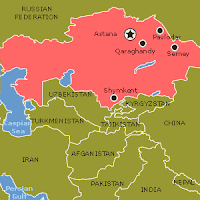Clare Tsang

An election the world keeps a close watch.
Iran’s tenth presidential election was held on 12 June 2009. It had been considered as a battle between the “ruling conservative” Mahmoud Ahmadinejad, and the Reformist, Mir-Hossein Mousavi. After a month of sweeping convass and debate, the Islamic Republic News announced the astonishing victory of the incumbent Ahmadinejad. With 63% of the votes cast, Mr. President beated Mousavi, his closest opponent, who received 33% of the votes cast.
While the result was endorsed by the Supreme Leader, Ayatollah Ali Kharmenei, and countries such as Russia, China and India, its authenticity was challenged by western media as well as many voters. The European Union and the United Kingdom had expressed concerns over alleged irregularities during the vote.
Their concerns were not without reasons. Apparently Tehran had gotten tired of its conservative leaders. Mousavi had been seen as "the definite winner" by western media during the pre-election stage also because of his belief in liberty that many had dreamt of. "Moral police" and discriminative law against women are the first things to be kicked out of Iran if he won the seat. However, the political chief of the Revolutionary Guard threatened to crush any "green movement" against the Islamic regime by Mousavi.
The pressure was on, what next?
In response to the results, Mousavi sent an official appeal letter to the Guardian Council, Iran’s powerful clerical group in order to call for the election to be cancelled. He claimed that he was the real winner and that fraud was widespread and a review of the election must be put in place. Further, a series of cyber-strikes, blackouts of text messaging and blocks on pro-Mousavi Websites and widespread Internet disruptions had raised concern over the fact that authorities were prepared to impose pressures on the reformist movement. It was said that some polling stations were closed early when people were still waiting to vote and that Mousavi's observers were expelled from some counting sites.
One day after the announcement of the election results, supporters of Mousavir started to protest on streets. Protests soon began to grow and resulted in violence. Despite the political unrest, the vote was not annulled. Large protests continued until the Supreme Leader Ayatollah Ali Khameini’s speech of declaring the legitimacy of the election, urging the protests to stop, and calling for the execution of the demonstrators for they were “people who wage war against God.”
The Iranian government has confirmed that there were twenty people dead during the protests, while dissidents claimed that there were about 250 deaths in the ten days preceding June 25.
What are the issues?
The Iran Presidential Election has revealed a number of social and political issues.
1) Manipulation of Political Leaders and Press:
Before the election was carried out, most surveys in the media were seen as biased or manipulated to support campaign objectives. It seemed that there was a general pattern which put either Ahmadinejad or Mousavi in the first two places, while Karroubi and Rezai were the runner-ups.
It also appeared that the balance of political power had portrayed Ahmadinejad in a better position. Further, the fact that the Supreme Leader, who controlled all the main state institutions, had publicly supported Ahmadinejad suggested that Ahmadinejad had a strong backing.
2) International monitors:
International election monitors are not allowed in Iran. In 2005 election, when Ahmadinejad won the presidency, there were some allegations of vote rigging from losers, but such claims were never investigated.
3) Censorship:
There seemed to be a pattern of behavior of the Iranian government imposing limitations of the reporting of the aftermath of the election. Several journalists have been arrested for being reporters of the post-election protests. The Ministry of Culture has also issued a directive which banned all foreign reporters from leaving their offices. However, Ahmadinejad claimed that there was “ absolute freedom of speech” and that no one should worry about freedom in Iran. It has been alleged that many of the Internet sites, including Youtube and Facebook, were shut down by the Iranian government.
4) Economic Concerns
It was suggested that the campaign rhetoric and opinion polls before the election has reflected the fact that economy was a major concern in Iran. Serious worries included global recession, falling oil prices, government overspending, high inflation and high unemployment. As a result, issues such as civil liberties (particularly women’s rights and freedom of the media) were overshadowed.
Concerns of UN
On 7 July 2009, six UN human rights experts expressed grave concerns about the mass arrests and the ill-treatment of opposition supporters in the weeks following the Iranian presidential election. The experts issued a joint statement which called on the Iranian Government to ensure all citizens’ human rights and to allow independent scrutiny of the current situation.
However, freedom of expression and peaceful assembly were undermined and despite the warnings from senior UN rights officials about the possible use of excessive police force by some militia members, many continued to protest. It resulted that at least 20 people were killed and hundreds of others were seriously injured since 12 June.
It was publicly known that the Iranian government had previously made claims against the UN. They have made claims of the UN being racist. It is likely that the UN’s concern over the human rights issues in Iran would result in Iran’s claims that the UN were intervening their internal matters.
Some western analysts and reporters have expressed doubts about the result of the election. The Amnesty International has also called for an investigation into the “shocking scenes of violence meted out by the security forces”. As a result, the Iranian government has made protests to representatives from the UK, France and the Czech Republic for what it saw as their meddling in internal Iranian affairs.
References:
http://en.wikipedia.org/wiki/2009_Iranian_Election_Protests
http://www.huffingtonpost.com/2009/06/12/irans-presidential-electi_n_214657.html
http://www.guardian.co.uk/news/blog/2009/jun/16/iran-uprising
http://www.un.org/apps/news/story.asp?NewsID=31394&Cr=iran&Cr1=





